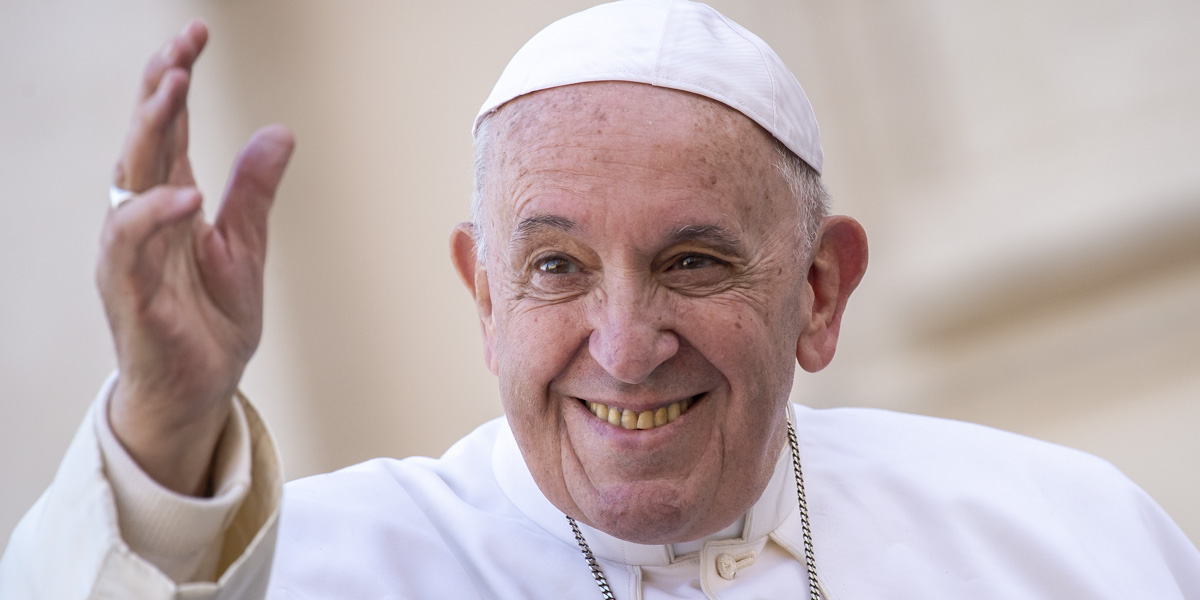Pope Francis closed the Wednesday general audiences of 2020 by offering another installment in his teaching on prayer, this time considering the prayer of thanksgiving.
Drawing from the story of the 10 lepers who Jesus healed, recounted in Luke 17, the Pope said that “this narrative, so to speak, divides the world in two: those who do not give thanks and those who do; those who take everything as if it is owed them, and those who welcome everything as a gift, as grace.”
The Catechism says: “Every event and need can become an offering of thanksgiving” (n. 2638). The prayer of thanksgiving always begins here: to recognize that grace precedes us.
We were thought of before we learned how to think; we were loved before we learned how to love; we were desired before our hearts conceived a desire. If we view life like this, then “thank you” becomes the driving force of our day.
And how often we even forget to say “thank you.”
To live, the Holy Father said, is “above all to have received. To live is above all to have received: to have received life! All of us are born because someone wanted us to have life. And this is only the first of a long series of debts that we incur by living. Debts of gratitude.”
Meet Jesus
Growing in gratitude, the Pope continued, comes from meeting Jesus.
The Gospels attest that when Jesus passed by, He often provoked joy and praise to God in those whom He met. The Gospel accounts are filled with prayerful people who are greatly touched by the coming of the Saviour. And we too are called to participate in this immense jubilation.
Pope Francis reflected that of course all 10 of the lepers were happy to have recovered their health. But one of them “experienced an additional joy: In addition to being healed, he rejoices at meeting Jesus.”
He is not only freed from evil, but he now possesses the certainty of being loved.
This is the crux: When you thank someone, give thanks, you express the certainty that you are loved. And this is a huge step: To have the certainty that you are loved.
It is the discovery of love as the force that governs the world – as Dante said: the Love that “moves the sun and other stars” (Paradise, XXXIII, 145).
We are no longer vagabonds wandering aimlessly here and there, no: We have a home, we dwell in Christ, and from that “dwelling” we contemplate the rest of the world which appears infinitely more beautiful to us.
We are children of love, we are brothers and sisters of love. We are men and woman who thank.
Cultivate joyfulness
The Pope made the invitation to “seek to remain always in the joy of encountering Jesus” and to “cultivate joyfulness.”
“The devil, instead, after having deluded us – with whatever temptation – always leaves us sad and alone,” he said. “If we are in Christ, then there is no sin and no threat that can ever prevent us from continuing joyfully on our way, together with many other companions on the road.”
So, the Pope said, “let us not forget to thank: If we are bearers of gratitude, the world itself will become better, even if only a little bit, but that is enough to transmit a bit of hope.”
The world needs hope. And with gratitude, with this habit of saying thank you, we transmit a bit of hope. Everything is united and everything is connected, and everyone needs to do his or her part wherever we are.
The path to happiness is the one Saint Paul described at the end of one of his letters: “Pray constantly, give thanks in all circumstances; for this is the will of God in Christ Jesus for you. Do not quench the Spirit” (1 Thes 5:17-19).
Do not quench the Spirit, what a beautiful project of life! Do not quench the Spirit that we have within, that leads us to gratitude.
Enjoy these images from Aleteia’s Antoine Mekary and other Vatican photographers, reflecting the pope’s joy!

